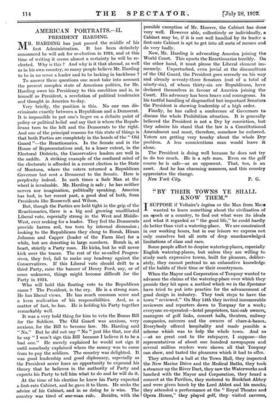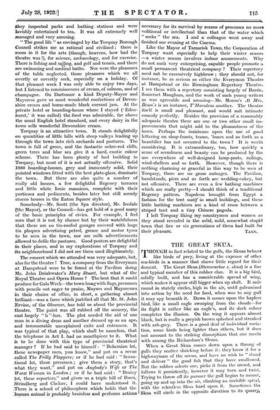`BY' THEIR TOWNS YE SHALL KNOW THEM."
j SUPPOSE if Voltaire's ingenu or the Man from Mara wanted to learn something about the civilization of an. epoch or a country, to find out what were its ideals, and what it regarded as " the good life," he could hardly do better than visit a watering-place. We are constrained in our working hours, but in our leisure we express not only, ourselves but all sorts of deep unacknowledged limitations of class and race.
Some people affect to despise watering-places, especially English watering-places, but unless they are willing to study such expressive towns, built for pleasure, deliber- ately, they cannot pretend to an exhaustive knowledge of the habits of their time or their countrymen.
When the Mayor and Corporation of Tbrquay wanted to advance the claims of the watering-place over which they preside they hit upon a method which we in the Spectator have tried to put into practice for the advancement of good design in industry. They took steps to have the town " reviewed." On May 14th they invited innumerable reviewers and reporters down to Torquay for a week; everyone co-operated—hotel proprietors, taxi-cab owners, managers of golf links, concert halls, theatres, railway companies, caterers and the owners of chars-11-bans.: Everybody offered hospitality and made possible a scheme which was to help the whole town. And so —at no great cost to the ratepayer, I suppose---the representatives of about one hundred newspapers and several million readers were shown all that Torquay can show, and tasted the pleasures which it had to offer.
They attended a ball at the Town Hall, they inspected the New Marine Drive and the Medical Baths, they took a steamer up the River Dart, they saw the Waterworks and lunched with the Mayor and Corporation, they heard a concert at the Pavilion, they motored to Buckfast Abbey and were given lunch by the Lord Abbot and his monks; they attended a 'performance at the " Royal Theatre and Opera House," they played golf, they. visited caverns, *hey inspected parks and bathing stations and were lavishly entertained to tea. It was all extremely well managed and. very amusing.
" The good life " as envisaged by the Torquay Borough Council strikes me as rational and civilized ; there is 300111 in it for the arts (though, heavens, how had the theatre was !), for science, archaeology, and for exercise. There is fishing and sailing, and golf and tennis, and there are swimming and medical baths. Nor were the pleasures of the table neglected, those pleasures which we all 'overtly or covertly seek, especially on a holiday. Of that pleasant week I was only able to enjoy two days, but I listened to reminiscences of cream, of salmon, and of champagne. On Dartmoor a kind. Deputy-Mayor and Mayoress gave us most wonderful confections of Devon- 'shire - cream and home-made black currant jam. At the private hotel or boarding-house where I stayed (` Eden- burst,' it was called) the.food was admirable, far above t he usual English hotel standard, and every dairy in the town sells wonderful Devonshire cream.
Torquay is an attractive town. It stands delightfully on quantities of little hills with steep valleys leading up through the town into rich_ orchards and pastures. The town is full of green, and the fantastic .ochre-red cliffs, green trees and blue sea give it a hard, exotic colour Scheme. There has been plenty of bad building in Torquay, but most of it is not actually offensive. Solid .1880 boarding-houses, grey and _immensely solid, their pointed windows fitted with the best plate-glass, dominate the town. But there are also quite a number of really old houses, a few delightful Regency terraces and little white • Ionic mansions, complete with their porticoes and pediments, besides later but still seemly; stucco houses in 'the Eaton Square style.
Somebody—Mr. Scott (the Spa director), Mr. Iredale (the Mayor), or the Council—has got hold of a good many of the basic principles of civics. For example, I feel sure that -it is not by chance but by their watchfulness that there are no .tin-roofed garages covered with huge tin plaques advertising petrol, grease and motor tyres. to be seen in the town, nor are milk advertisements Allowed to defile the pastures. Good posters are delightful in their places, and in my • explorations of Torquay and fits neighbourhood I did not see them used illegitimately.
The concert which we attended was very adequate, but, alas for the theatre True, a company from the Everyman at Hampstead were to be found at the Pavilion doing Mr._ John Drinkwater's .Mary _Stuart, but what .of. the Royal Theatre and Opera House ? The best that it could produce for Gala Week—the town hung with flags, pressmen with pencils out eager to praise, Mayors and Mayoresses in their chains of office, in short, a gathering almost brilliant—was a farce which justified all that Mr. St. John Ervine, of the Observer, has told us about the provincial theatre. The paint was all rubbed off the scenery, the east largely " h "-less. The plot needed the aid of one man in a diving dress and another dressed up as an ape, and innumerable unexplained exits and entrances. It was typical of that play, which shall be nameless, that the telephone in Act I. had no mouthpiece. to it. What is to be done with this type of provincial theatrical manager ? If he had said to himself.: " Bohemian lot, these newspaper men, you know," and put on a revue .called The Frilly Flappers; .or if he had said : " Sensa- tional lot, these pressmen ; give them a story, that's .what they want," and put on Anybody's Wife or The Worst Woman in London ; or if he had said : " Brainy lot, these reporters;" and given us a triple bill of Ibsen, .Strindberg and Chekov, I could have understood it. There is a school of philosophers ,which holds that the :human animal is probably brainless and performs actions necessary for its survival by means of processes no more volitional or intellectual than. that of the water which " seeks " the sea. I and a colleague went away and finished our evening at the Cinema.
Like the Mayor of Tamarisk Town, the Corporation of Torquay want especially to help their winter -season —a winter season involves indoor amusements. Why do not such very enterprising, capable people promote a small permanent theatrical company ? Their repertory need not .be excessively highbrow ; they should not, for instance, be as serious as either the Everyman Theatre at Hampstead or the Birmingham Repertory Theatre. I see them with a repertory consisting largely of Barrie, Somerset Maugham, and the work of such young writers as was agreeable and amusing—Mr. Monro's At Mrs. Beam's is an instance, T'111arsdens another. The theatre .itself is small and pleasant, and would suit intimate comedy perfectly. Besides the provision of a reasonably adequate theatre there are one or two other small im- provements that might add to the pleasantness of the .town. Perhaps the insistence upon the use of good lettering on shop-fronts, trams, 'buses and so forth as a beautifier has not occurred to the town ? It is worth considering. It is extraordinary, too, how quickly a sense of seemliness and beauty can be produced by the use everywhere of well-designed lamp-posts, railings, wind-shelters and so forth. However, though there is nothing charming or graceful in this way to be seen at Torquay, there are no .gross outrages. The Pavilion, bandstands, piers and so forth are wedding-cakey, but not offensive. There are even . a few bathing machines which are really pretty—I should think of a traditional Regency pattern. Napoleon brought from Egypt a fashion for the tent motif in small buildings, and these little bathing machines are a kind of • cross' between a striped tent and a tiny Chinese pagoda.
I left Torquay liking my .countrymen and women as they stood revealed in the solid, mild, somewhat stupid town that five or six :generations of them had built for







































 Previous page
Previous page